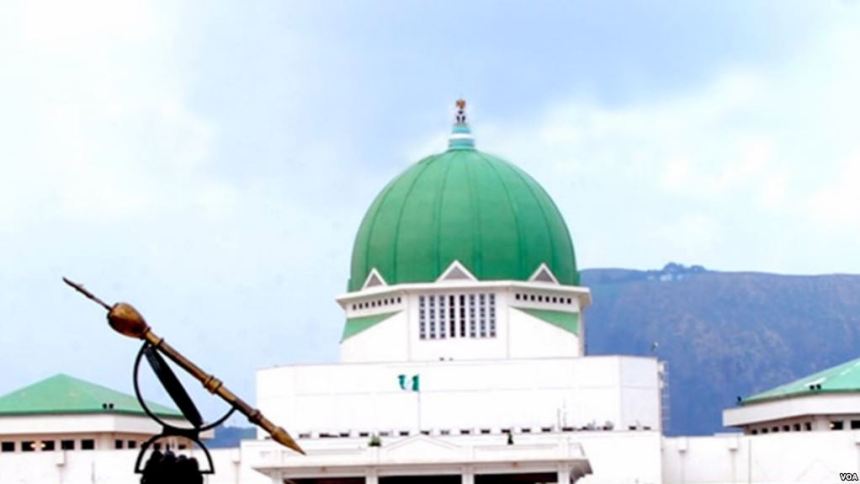Udo Udoma Excited As National Assembly Passes N10.59 trn Budget For 2020
AMINA HUSSAINI, Abuja,
The National Assembly has passed the 2020 fiscal policy increasing it from the N10.330,416,607 submitted by President Muhammadu Buhari to N10.594,362,364 as the lawmakers work with the plan of the executive to return the country to January to December budget cycle.
This development has excited the former minister for national planning and budget, Udoma Udo Udoma who championed th return to the January to December budget cycle.
The Senate in its version which the House of Representatives concurred to, increased the benchmark price of crude from 55$ to 57$, however, the exchange rate at N305 to 1$ was retained.
The two chambers passed their individual version on Thursday with same figures following the working relationship between the Committees on Appropriation and that of the Finance in the two chambers since the beginning of the consideration of the budget.
With this development, there will not be a separate date for harmonisation of the budget by the two chambers again.
Senator Ibrahim Jibrin, the chairman committee on appropriations explained that budget figure was increased to allow for interventions in critical areas of national security, road infrastructure, health, social needs, water as well as mines and steel development.
President of the Senate, Ahmad Lawan had announced on Wednesday that the 2020 Appropriation bill before the parliament will be passed today the 5th of December.
He informed lawmakers at plenary shortly after the Public Procurement Act 2007 amendment bills were passed, which he believes, will complement the 2020 budget.
According to Lawan, the Public Procurement bill passed by the upper chamber is the icing on the cake on the eventual passage of the 2020 budget.
Chairman of the Committee, Senator Shuaibu Isah Lau (PDP, Taraba North), in his presentation, said: “certain amendments were made on the bills to encapsulate the ingredients of the varied views collated from experts and professionals, aimed at adding value to the Procurement Act.”
The Senate, in a clause-by-clause consideration of the bill, adopted the recommendations of the committee with slight amendments made to Section 1 under the Establishment of National Council on Public Procurement.
The Senate also adopted the committee’s recommendation on the issuance of Certificate of No Objection which shall be issued by a Committee of Directors of the Bureau to the chaired by the Director-General of the Public Procurement Bureau.
“The public procurement process in Nigeria has been a big bottleneck for some time, probably since it was passed.
“I believe that with this amendment, the procurement process will be faster and better, as will be the budget implementation process.
“Surely, this bill will have to go to the House of Representatives for them to concur.
Similarly, the upper chamber considered the recommendation of the committee to review upwards the mobilization fee from 15 per cent to 20 per cent for local contractors as insufficient.
Accordingly, Section 35 of the Act was amended to provide for not more than thirty percent mobilization for local contractors.
The amendment for an upward review of thirty-five per cent mobilization for local contractors was initially proposed by Senator Jibrin Barau (APC, Kano North) and seconded by Ibikunle Amosun (APC, Ogun Central).
The Senate, however, settled for a thirty-per cent review moved by Senator Abba Moro (PDP, Benue South) and seconded by Senator Rose Oko (PDP, Cross River North).
Meanwhile, the immediate past Minister of Budget and National Planning, Udoma Udo Udoma, is excited that the January to December fiscal year can be achieved with the alignment of the leadership of National Assembly with the Executive.
Senator Udoma who started the campaign for the return to the January to December budget cycle had consistently blamed the inability to achieve the more strategic fiscal cycle on the frosty relationship between the two arms of government; but he was hopeful that the present administration would still be achieved with the mutual relationship between the leadership of the National Assembly and the Executive.
At his end-of-tenure interaction with the media in Abuja on Tuesday, May 21 this year, Senator Udoma had pointed out that achieving the goal will require a very close working relationship of trust and synergy between the two arms of government.
He regretted that the administration was unable to achieve it in the first four years because of the friction between the two arms of government, but predicted that “in Mr. President’s second term we might have a situation where the Executive and the leadership of the National Assembly are much more aligned. This will help not only to be able to achieve a return to the January to December fiscal year, but to have a much smoother budget process”, he said.
Senator Udoma had explained that a return to the January to December fiscal year for a budget when the operation of the current budget only commenced in June or July was a very challenging assignment.
In order to achieve a return to a 1st of January commencement date, Senator Udoma indicated that the budget must ideally be delivered to the National Assembly by September. “But when you are operating a budget which commenced only in June or July, by September you would have had no idea how the existing budget is likely to perform”.
“Indeed, given the procurement process, for a budget which starts running in June or July, there might have been little or no capital releases by September. The only way to return to a January to December fiscal year, under those circumstances, is for there to be agreement between the Executive and the National Assembly to produce a budget on the basis of significant assumptions” he told journalists at the conference.
Senator Udoma was therefore delighted that the alignment between the 9th Assembly (in its first budget outing) with the Executive is poised to return the country to the January to December fiscal year.



Comments are closed.